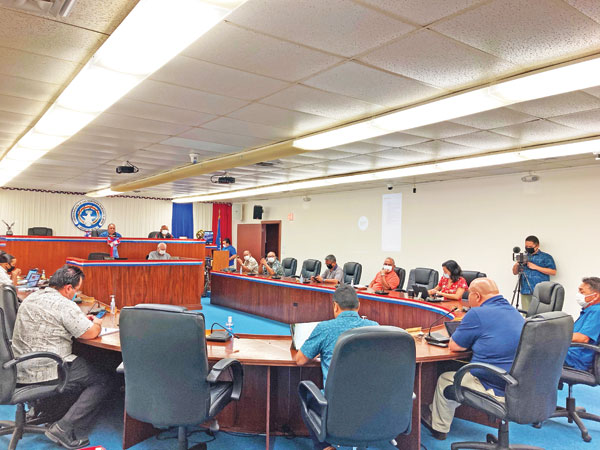CDC: NMI among lowest in US COVID-19 infections

COVID-19 Task Force chair Warren Villagomez is joined by other members during a meeting of the House of Representatives yesterday. (IVA MAURIN)
The CNMI is among the lowest in terms of the infectious spread of COVID-19 in the United States.
COVID-19 Task Force chair Warren Villagomez announced this during a House of Representatives meeting yesterday, citing an email he received from the Centers for Disease Control and Prevention of the Department of Health and Human Services, based on a survey that the CDC has conducted.
“From all the good reports that’s been submitted to HHS and CDC with regards to efforts here in the Pacific…we are at the lowest bottom [of the] totem pole in regards to COVID-19 infectious spread,” he said.
The survey result means that all the work and planning that the CNMI has been putting together is showing results, Villagomez added. “With all the efforts and planning that’s been going on with CDC, HHS, and of course, the Commonwealth Healthcare Corp., and the holistic government approach, making sure that everyone is engaged in this particular mission, we see the work that’s been done and the fruition of where we are at,” he added.
The Commonwealth has yet to see the full effect of its COVID-19 efforts, particularly as the island has yet to open its doors to tourists. According to Villagomez, the task force has been wanting to come up with models and ideas to make sure that risks of a COVID-19 spread is minimized, for the community and for those entering the island, when the CNMI opens.
The CNMI has a target date of July 15 for the reopening of its tourism industry.
Quarantine relaxed?
With the recent upsurge of COVID-19 cases in the U.S. mainland, the confirmation of a second wave in South Korea, and the CNMI’s reopening date moving closer, there are worries in the community that the CNMI government could be relaxing the quarantine protocols too early than it should be.
Last week, the implementation of a home quarantine as an option for incoming passengers was announced, which drew mixed reactions from the community.
Rep. Edwin K. Propst (D-Saipan) raised such a concern, saying that, as COVID-19 cases increase drastically in the U.S. mainland and elsewhere, quarantine restrictions in the CNMI, which have been successful, are becoming more relaxed.
“We are aware of the risks,” Villagomez said in response, adding that the restrictions can be tightened anytime. He added that the task force is being “very mindful” of the monetary obligation that the CNMI government is being put into, regarding quarantine sites.
“This is the best approach, where we’re at now, sending residents home and doing self-quarantine based on our data, our numbers. …We continue to learn different things every day, in approaches that we take, at the airport, the screening that we are doing, the entry point, the registration efforts,” he added.
Expanding testing to precincts
Further, the community-based testing is about to expand into the villages as the CNMI transitions into precinct-based testing.
Villagomez yesterday appealed to the members of the House of Representatives for help in moving the testing to the precincts, to increase its accessibility to members of the community with limited mobility or access to transportation.
“We need assistance at the precinct level, to coordinate precinct-level testings, to embrace and engage with our community to promote testing within the precincts,” he said.
Villagomez also asked House Committee on Health and Welfare chair Rep. Jose Itibus (R-Saipan), also the House’s COVID-19 Task Force member, to guide them to a point of contact in the Legislature to initiate the precinct testing. Help is also needed on the site that would be best, as well as in identifying the vulnerable population within the precincts.
Villagomez also wanted to know how to meet the needs of those in the community who have no cars or those with language barriers. “At what level of coordination do we need to bring our community that hasn’t been tested to be tested,” he added.
As the COVID-19 Task Force works on the precinct-based testing, Villagomez clarified that the community-based testing has not stopped. “It is still ongoing. We haven’t shut down testing. Just yesterday, we’re doing community-based testing at Kanoa [Resort]. We coordinated efforts with the business community, it’s still a moving effort.”























